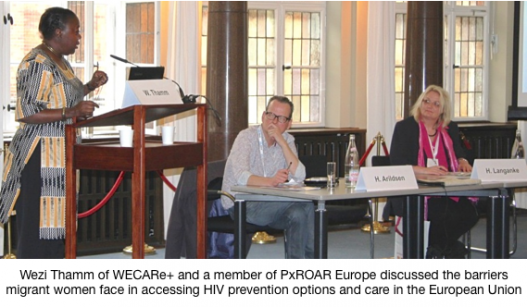top

HIV prevention research took the stage at the 110th “jubilee congress” of the German STI Society (DSTIG) in Berlin last week. At the invitation of the organisers, AVAC and HIV Europe co-hosted a symposium—Modern Prevention Strategies—where panelists and audience members discussed the state of the art in HIV prevention and what modern prevention strategies mean for different affected communities in the region.
Members of PxROAR Europe were among those leading the discussions. Harriet Langanke, of the German Sexuality and Health Foundation (GSSG), led a session focusing largely on some of the highly affected communities in the region—migrant women and gay men and men who have sex with men (MSM)—and the potential opportunities for members of these communities to access to new all HIV prevention options.
Wezi Thamm, Chair of the international network WECARe+ (Women in Europe and Central Asia Regions Living with HIV) and a migrant from Zambia herself, made clear that legal conditions, language barriers and lack of insurance too often hinder migrant women from accessing HIV prevention and care. She demanded not only the development of new prevention options but that the prevention field focus on and address issues that may limit access.
During a special “poster walk” exploring the featured poster area at the conference, Harriet presented an abstract (co-authored by other PxROAR Europe members): Modern HIV Prevention Strategies: What are the implications for German populations? Community perspectives (click to download).